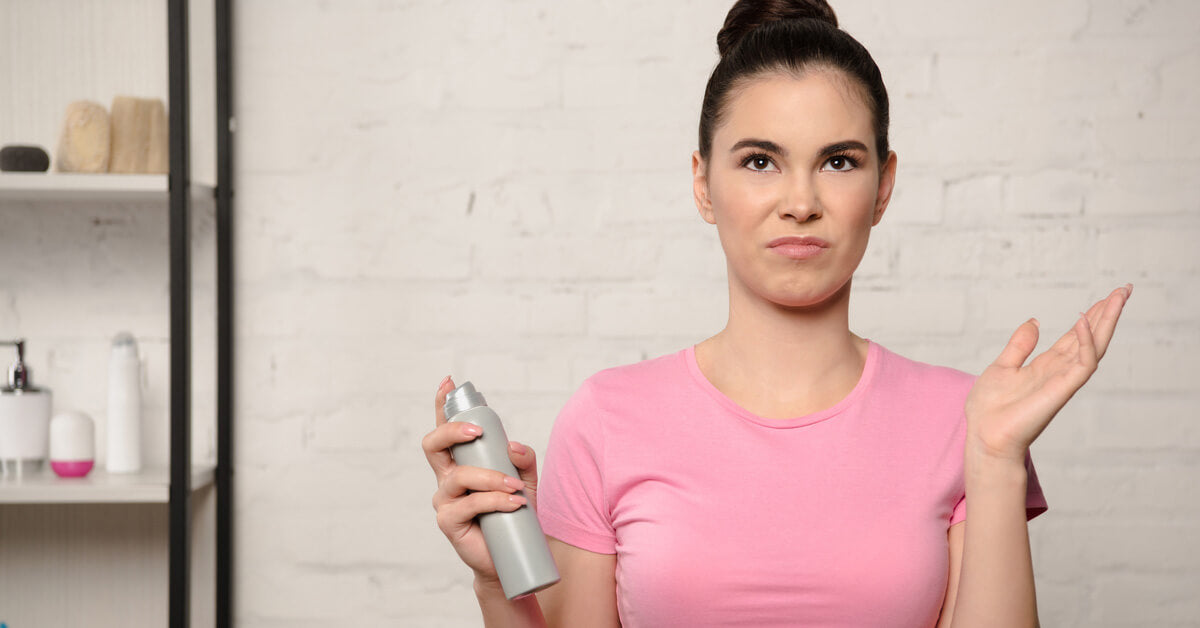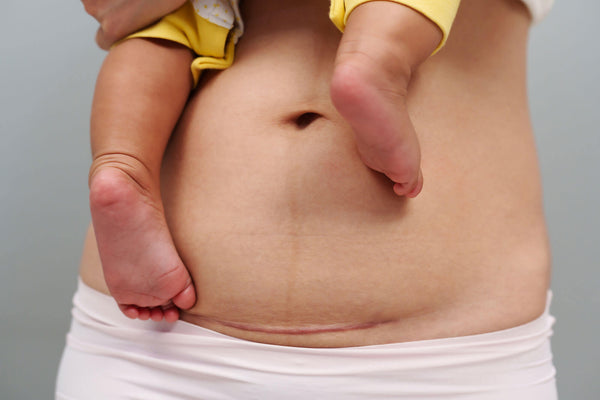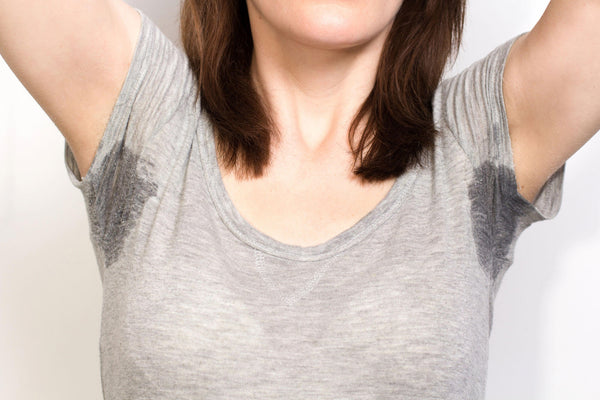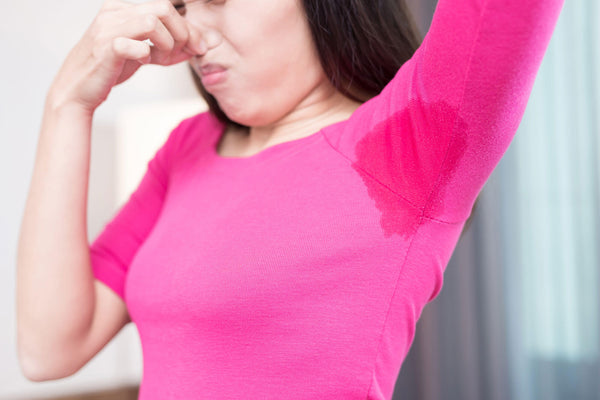
It’s Not Just You: Postpartum Sweating and Body Odor Are Normal!
Postpartum body odor is an annoying occurrence during the postpartum period - but it's more common than you think! Read on to learn why this happens, and how you can deal with it.
Giving birth is a monumental event on a woman's body, and the postpartum body goes through many changes as the body recovers from having a baby. Hormonal shifts can be partly to blame for many unpleasant symptoms during postpartum recovery. If you're dealing with postpartum sweating and body odor, here's what you can do to deal with it.
What are normal postpartum symptoms?
Postpartum recovery comes with many changes, and not every woman's experience is the same. Here are some common postpartum symptoms that you might experience after giving birth:
-
Postpartum bleeding
-
Hair loss
-
Cramping
-
Back pain
-
Depression or mood swings
-
Bloated belly
-
Frequent urination
-
Swelling of the legs or ankles
-
Vaginal discharge
-
Breast tenderness
What causes postpartum sweating and body odor?
Giving birth might leave you feeling less than stellar, and unfortunately, unpleasant smells are a common side effect of the recovery after having a baby. Why does postpartum body odor occur?
Shifting hormones during the postpartum period
Feeling a little "funk" after having a baby? Hormones might be to blame!
Just like other big hormonal shifts that a woman goes through (puberty, menstruation, pregnancy, menopause), unpleasant smells tend to be more common. The ever-changing hormones spike in pregnancy and postpartum, and the change can account for extra sweat and the scent of that sweat.
Because women carry around a lot of extra fluids in the body during pregnancy, the first few weeks after giving birth involve a lot of fluid loss. Estrogen and progesterone levels drop significantly in the first weeks postpartum, and that sudden dip in hormones can cause the brain to think you're too hot and cause increased sweating (especially night sweats).
More sweat often means you'll have a stronger smell.
Breastfeeding
For women who choose to breastfeed their new baby, there's a possibility that they will sweat more than women who feed their baby formula. Why is this? The hormone responsible for milk supply, prolactin, suppresses estrogen levels in the body.
Hormones change intensely postpartum, no matter how you feed your baby. However, there seems to be a strong correlation between breastfeeding and increased sweating.
Breastfeeding in the early weeks is a time when the body is trying to figure out how much milk the baby needs. It's common to have an oversupply and leak - and leaked, dried-up milk on your clothing can also have an unpleasant smell!
Lochia (vaginal discharge)
After birth, the body is re-regulating itself. Increased discharge is one common side effect of postpartum recovery. Thankfully, it is totally normal, as the uterus returns to normal after delivery.
Lochia refers to the mixture of blood, mucus, tissue, and anything else in the uterus from pregnancy. It can smell like period blood, but stronger. Some women report it to smell sour, stale, or musty.
It should start heavy and then begin to taper off in the following weeks. Regular showers can help, but any new parent should know that lochia is to be expected and isn't concerning within the first 6-8 weeks postpartum. If you are concerned about your postpartum discharge, contact your OB-GYN.
Concerns about hygiene
New parents have a lot to recover from, whether they give birth vaginally or by C-section. The body has to recover from the intense physical ordeal that it went through.
Taking regular showers can be uncomfortable because of tears or swelling from childbirth. It can be painful to go to the bathroom as well. Discomfort is normal, but it can make it more difficult to practice good hygiene - and this can affect a woman's smell.
It's easy to lose track of hygiene and wellness routines when you're busy taking care of a needy newborn, too! Babies require a lot of work and attention, and it can be hard to squeeze in a shower.
Practicing proper hygiene is important for tackling postpartum body odor. Just be careful when bathing - don't use soap inside the vagina, as it needs to heal. Taking a shower regularly and changing into new clothes often can help with odor issues.
Less time for self-care
The first months after having a baby are a whirlwind. Nobody is sleeping, the mother is recovering from the physical trauma of childbirth, and the baby requires endless attention around the clock. This can have a big effect on a woman's ability to take care of herself!
It can be hard to find time to take a shower...let alone do your makeup, practice your skincare regimen, or do your hair. And you're probably wearing the same outfit multiple times.
Give yourself some grace during this time. Hormonal changes are enough to deal with themselves, but adding on more postpartum symptoms can just make everyday life that much more difficult. Not having time to take care of yourself properly can also contribute to odor.
Do not feel bad for reaching out for help! Find a trusted friend or family member who can commit to snuggling your newborn for a few hours a week so you can practice caring for yourself. Change your clothes, find good deodorant, drink extra fluid, care for your skin, and try to get enough sleep!
Postpartum night sweats
Postpartum night sweating is very common - and very annoying. Many women report waking up in the middle of the night with their clothes and bed drenched in sweat! Thankfully, sweating typically isn't a cause for concern - unless it is accompanied by pain, fever, or chills. In that case, it's time to consult your OB-GYN doctor.
Sweating at night can also make it difficult to sleep. Estrogen and progesterone levels fluctuate, causing the brain to increase sweat levels.
Night sweat is usually more common in the first weeks following delivery. Hormone levels change drastically during this time, this can contribute to postpartum odor.
How to manage sweat, odor, and smell postpartum
In the first few months postpartum, you'll want to focus on your recovery. Although more sweating can be a frustrating thing to deal with, it comes second to your recovery. Make sure you're healing properly, resting as much as possible, having a good start to your breastfeeding journey, and enjoying all those new baby cuddles.
Here are a few tips for dealing with postpartum smell and odor:
-
It’s safe to use deodorants. You can still use deodorants and antiperspirants just as you did before the baby's arrival. You can also look for a stronger product if you want - they are safe. Try to avoid ones with strong scents, and make sure to not use any near the breast area if you are nursing.
-
Don't use soap inside of your vagina. Pregnancy and childbirth can change how the vaginal area feels and heals. It might be tempting to "fix" the problem by overusing soap to deal with more postpartum smells, but you should not use soaps internally.
-
Don’t over-bathe. You don't need to take 3 showers a day - just be sure to keep yourself clean.
-
Change your clothes. Getting dressed is good for your physical and mental health! It can help you feel fresh when dealing with more underarm sweat and stronger body odor.
-
Clean yourself after nursing the baby. Wipe off any spilled breast milk.
-
Change your bedding frequently. Your bedding can be full of sweat, baby spit-up, leaked breast milk, and more - be sure to wash it often!
When to Worry About Postpartum Odor
When should you talk to a doctor about body odor changes?
Postpartum sweating usually isn't a cause of serious medical problems, but there are a few exceptions. If your sweat glands are on overdrive, and you also experience pain, irritation, fever, chills, body aches, or extreme exhaustion, contact your doctor or healthcare provider.
Postpartum odor issues are just a women's health issue that many experience after having a baby - and typically, it's nothing to stress about!
The first year postpartum often brings big changes to the body. You're shedding water weight, dealing with fluctuating postpartum hormones, having annoying night sweats, and many other symptoms that can contribute to perfectly normal odor issues. Don't stress. You won't be funky forever! Just make sure you're drinking lots of fluids, resisting the urge to overwash, and taking care of your physical and mental health.
Sources:
https://health.clevelandclinic.org/postpartum-sweating
https://www.popsugar.com/fitness/postpartum-body-odor-49346421
|
|
Meet Our KeaMommy Contributor: Kaitlyn Torrez I’m Kaitlyn Torrez, from the San Francisco Bay Area. I live with my husband and two children, Roman and Logan. I’m a former preschool teacher, currently enjoying being a stay at home mom. I love all things writing, coffee, and chocolate. In my free time, I enjoy reading, blogging, and working out. |



























































